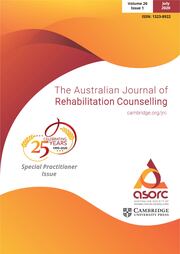No CrossRef data available.
Article contents
A role for cognitive remediation therapy for job seekers with neuropsychiatric disorders
Published online by Cambridge University Press: 01 April 2020
Abstract
People with mental illness and traumatic brain injury experience difficulties in gaining and maintaining employment and have a higher unemployment rate because of their symptoms and poor social skills including cognitive impairments. Cognitive remediation is an intervention developed to improve cognitive functioning such as attention, memory, and problem-solving, by providing them with specific designed cognitive exercises. After practicing those cognitive tasks repetitively and massively, people with cognitive deficits will improve cognitive processes which lead to better cognitive performance. There is evidence supporting the benefits of cognitive remediation in improving employment-related outcome. Thus, it might have a role for job seekers with neuropsychiatric disorders and cognitive dysfunctions.
Information
- Type
- Articles
- Information
- The Australian Journal of Rehabilitation Counselling , Volume 26 , Issue 1 , July 2020 , pp. 22 - 25
- Copyright
- © The Author(s) 2020. Published by Cambridge University Press and The Australian Journal of Rehabilitation Counselling

